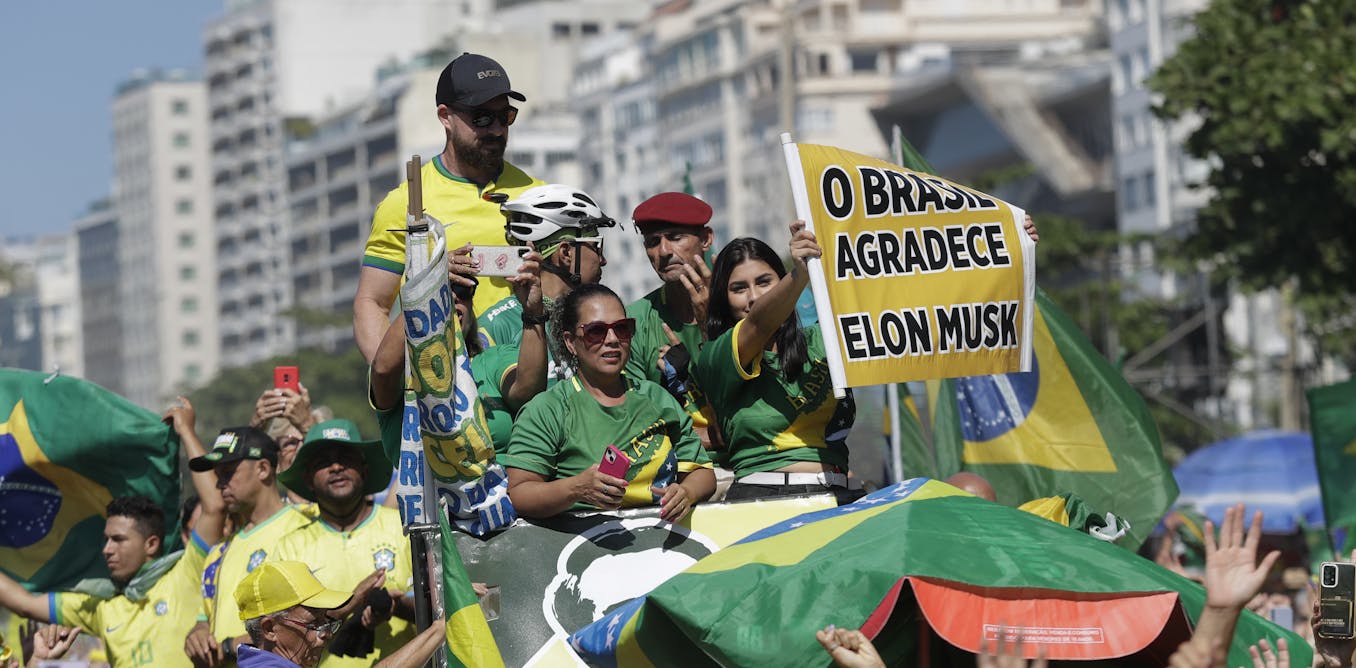I know it’s not full-on ban we’re seeing here but I’m always agains banning things. It just sends the wrong message and it’s harmful to everyone.
Plenty of good reasons to ban things, even if they’re useful. Asbestos. In fact, banning asbestos didn’t harm anyone, as your comment would imply. It actually helped people.
I don’t think I have to clarify that I meant banning social media and such.
So by virtue of social media existing, it can’t be flawed? It can’t be broken? It can’t be harmful? It can’t be pushing racist and fascist ideology?
There’s a mountain of evidence showing the harms social media does, and you’re just acting like all that research doesn’t exist.
Musk complied with India, why isn’t he complying with Brazil?
Because our current government is center left and the accounts were supporters of the right. That’s all there is to it, he even reinstated Monark’s account, a podcaster from here that fled to the USA after arguing that Nazis should be free to have their own political party, and after arriving there said that we shouldn’t criminalize the consumption of CSAM, just production.
I’m all for adopting Wayland but some compatibility should be preserved. An outright ban seems a bit extreme.
😂👌🏻
Sure, X is a pool of sewage. But banning it? Why? Let them do what they want.
Let’s hope so. Destroy all a-social media platforms!
unfortunately i still have to side against national firewalls even when i think they’re extremely funny
I initially agreed with you but this is a bit different. Actually haven’t banned anything it’s just a court order so it wasn’t done because some politician decided it should happen it was done because of things that Twitter chose to do, or not do as the case may be.
Presumably this won’t be permanent provided the capitulate.
I think they don’t have a literal national firewall, rather they demanded every single ISP in the country to block the domain.
i’m pretty sure that’s how most national firewalls work. it’s still government censorship of internet resources on a national level
Anyone who tries to use software to access the platform now faces fines of up to A$13,000 per day.
Criminalizing access sounds worse than a national firewall but sure.
It wasn’t like a law banning X. They were Court ordered to do something and they didn’t do it.
Could that happen in other countries? I mean sure but not the way you’re implying.
The UK government has already accused them of stirring up riots.
We ban piracy sites on the largest ISPs, and could easily add X to that list.
That’s frankly a terrible idea. Us not doing this is what differentiates the free(er) world from authoritarian regimes like Russia or the PRC.
Judge tells the company to take down profiles that have been known to be used solely for spreading political lies. Company complies. Manbaby buys company, pedals back on previous compliance. Judge tells company to comply again. Company ignores it. Judge makes it a legal order. Company removes its legal representative from the country, so the company no longer “answers to the country’s laws”. Company’s IP addresses gets country wide block. That is censorship because…? Freeze peach?
Not that the judge in question, Alexandre de Moraes, is any sort of role model, what with him imposing a R$50,000 fine to anyone using a VPN to bypass the block, which is a clear overstepping of the order and hitting end users because “fuck them”, this is likely to be overruled later today. He also ordered to freeze Starlink’s assets (because they didn’t comply with the order to block xitter).
Your comment makes it apparent that you fundamentally do not even understand what censorship is. Legality has nothing to do with what censorship is and everything to do with limiting freedom of communication. Even something as basic (and undeniably both good and necessary) as taking down cp content is censorship.
In my view, censorship is inherently good only in limited circumstances, usually involving either that A) The very creation of the content is irreversably harmful (see above) or B) The content is highly intrusive (essentially forcing the audience to partake) in combination with consumption of said content being irreversably harmful (consider regulation of advertising in public spaces).
Historically, freedom of communication and organization has been the primary antidote to many authoritarian organizations (organized religions, autocratic monarchies, fascist & totalitarian regimes, corrupt leaders etc.), and this necessarily requires that centralized institutions cannot (in general) be allowed to dictate what is and is not acceptable discourse - that includes regulating “disinformation” outside of limited scopes.
Fundamentally, if our leaders say we are incapable of discerning fact from fiction, and rob us of that autonomy, they are also robbing us of our ability to freely choose our leaders, effectively demolishing democracy.
The Brazilian Internet Law (Marco Civil da Internet) says that the content to be removed via judicial intervention must be specified. It does not allow the blocking of entire accounts from a social media platform. In fact, Brazilian Constitution forbids this kind of censorship (Censura Prévia). The decision to block X nationwide is based on a series of decisions that blatantly violate Brazilian Law.
By the way, the dictator-judge Alexandre de Moraes ordered Starlink’s asset freeze before Starlink wouldn’t comply with X blocking.
The part of the law that talks about content removal (Section 3, articles 18 to 21) does not say that only content can be removed nor that accounts can’t be touched. Before Moraes, judges have ordered people to be locked out of certain social media, so there is precedent.
It’s also important to note that freedom of speech ends the moment it becomes a crime. Whether said xitter accounts have been committing crimes, and which crimes, is a different discussion
Fighting crime is desirable, but within the limits of the law:
Brazilian Internet Civil Rights Framework
Art. 19. In order to ensure freedom of expression and prevent censorship, the internet application provider may only be held civilly liable for damages resulting from content generated by third parties if, after a specific court order, it fails to take steps to, within the scope and technical limits of its service and within the specified timeframe, make the content identified as infringing unavailable, except for legal provisions to the contrary.
§ 1º The court order referred to in the caput must contain, under penalty of nullity, clear and specific identification of the content identified as infringing, which allows the unequivocal location of the material.
Note that the legislator took the trouble to say right at the beginning that the intention is to prevent censorship. Few laws are written in such detail as to reinforce their guiding principles in the middle of the provisions. If the legislator went to this trouble, it is because the intention of avoiding censorship is fundamental to this law. If judges are ignoring the law, they’re ignoring the will of the people.
I think you need to cancel your citizenship (and your family members’ citizenships) and move to russia or PRC.
I’ve written more than enough to mysteriously fall out a window in Russia or disappear into a “reeducation” camp in the PRC.
However, if you crave the boot of censorship so much, why not try it? Trade places with one of the more than billion people chafing under it in one form or another and we’ll see if you can report back after a month or two.
You don’t understand the terms “censorship” or “free speech”. It’s a mere internet polemic for you, something to act out about .
You have no clue what you are talking about.
No. The difference is we have democracy instead of despotism so you can vote for someone else if you are unhappy with your government. Also free press. And no, Europe ain’t perfect, but equating it to Russia is laughable.
The country implementing this is Brazil, so I am comparing them to Russia - and if we implement this in the EU, it will be a huge step towards Russian style authoritarianism.
As for why such a move would compromise the effectiveness of our votes, see my other comment here.
Here in Brazil we have a judge that concentrates the powers of: judge, prosecutor, victim, legislator, chief of Federal Police. And he wasn’t elected by the people. Are we still really a democracy? Are we so different from countries like Russia?
Judges in the STF (supreme court) are not directly elected by the people (because that would be disastrous in real life, people would vote for fun or ‘against the system’ in absurd candidates like reality show and football stars, or people would just not know what makes a good STF judge candidate). BUT they ARE indirectly elected by the people, by the process of: 1. Elected president chooses a list of candidates, three in order of preference. 2. Elected parliament approves the chosen candidate (or vetoes them all, and step 1 is repeated until approval). The institution is democratic, just not direct democracy. If people want 11 fachos in the STF, they can just consistently vote for a majority in parliament and win the presidency, over time they will nominate all the judges they wanted. (and no, that is not comparable to elected politicians because STF judges actually need to have very specialized knowledge intrinsically tied to their function, i.e. uphold the legal order from the constitution and interpret law in general).
It’s also good to remind people that separation of powers in Brazil has THREE powers, not 2 or 1. STF Judges, like the congress and the president, can and should weight in all the political topics if it is inside their sphere of functions (keep the integrity of the constitutional laws and regulations). Like interfering in fraudulent cases, ordering the police around if the police are doing something absurd and the congress and presidency are being neglectful until they stop contradicting the constitution and fundamental rights, ordering prisons to receive maintenance works if the police and congress and administration are neglecting their constitutional duties, etc and etc.
Yes
Again, you’d be shooting the messenger.
Also, the double-standards are stupid: countries in the Middle East block social media - bad; Brazil blocks X - good. Elon’s an asshole but that’s not the way you do things. If X is in the wrong what the government should to is apply a hefty fine. Or sue them. Or both.
Twitter isn’t the messenger. This is what they want you to think. Twitter is a private, for profit company. It’s not a public place lake the street. They have to be proactive and follow the local laws. They are responsible for what you can read on it as well as the people posting.
This is a huge difference with the street. The street is public not private, you’re responsible for what you say.
Internet is not the wilde west. Companies have to follow and adapt to the local law or just not operating there.
Elon just wouldn’t pay and sueing generally ends in a fine which Elon would again not pay. Eventually a blanket ban is the only effective solution if a company refuses to get along.
That’s your excuse? Weak. And very poor policy… He won’t do it let’s skip due process and go full censorship 'cos Musk’s easy to hate. Weird legal system that is…
First fine. Heavily. Only after the company fails to pay do you proceed to stronger deterrents.
By all means follow the other sheep.
Additionally, the judge froze the financial assets of Starlink, Musk’s satellite internet company, to cover unpaid fines amounting to 18.5 million reais ($3.28 million) imposed on X for non-compliance.
So, exactly what Brazil has done?
Edit:
Some more detail on the daily fines imposed, and total fines due.
https://www.theguardian.com/technology/article/2024/aug/30/elon-musk-x-could-face-ban-in-brazil-after-failure-to-appoint-legal-representativeThis freeze of Starlink’s financial assets is so absurd, that even Brazilian Speaker of the House (a big son of a bitch himself) criticized it. He made a comparison to another recent national scandal about retailer Americanas defrauding it’s accounting to hide the fact it is in deep debt. Its owner fled to Europe to avoid persecution. Under the same argument, they’d be authorized to freeze Ambev’s (beverage company which is partially owned by Americanas’ owner) assets to cover for Americanas’ debt.
The insane judge that ordered the asset freeze is so blinded by his vendetta against Elon Musk that he does dumb shit like this, which is putting a big stain on Brazil credibility to foreign investors. If a single insane judge can do this on his whim, who would want to invest in Brazil?
The key point here was 18.5 million in unpaid fines. If you wanna move the goal posts to liquidating related assets that’s fine, but you said due process has been skipped when very clearly due process was followed, musk ignored it and pretended to be above the law like he normally does, musk got his company banned.
There are legal ways for the judicial system to recover assets. Going after other companies, even if Musk has 40% stake on Starlink, is madness. One thing does not justify the other.
Sure, but the fines have gone unpaid.
The private owner of the private company X has enough money to cover the fines.
Brazil is now seizing assets to try and recover the amount due.X isn’t declaring bankruptcy. X is flaunting legal rulings and dodging fines.
If that scares away “investors” that are going to skirt or flaunt laws, rulings and legality then it seems like a decent result for Brazil.No minimally serious country destroys the legal separation between different companies so brazenly. If it is for such a thing to happen, it’s only on exceptional circunstances, and only after the a full lawsuit concludes its natural course, giving all affected parties the right to offer their defenses. Anything far from these basic civilizational principles is no more than a whim from a dictator’s inflated ego.
This is what “eat the rich” and “if a punishment is a fee, it’s an operating cost” mean. You get your company banned and personal assets seized. It’s delicious.
Anyway, I’m not going to take your outrage seriously.
First it was hell bent that no legal process had been done, which took me all of 2 seconds of googling to disprove.
Now it’s that only uncivilised places would dare seize personal assets. And somehow still that no legal process has been done.This has been going on for months, with musk acting like the man-baby he is.
https://www.cbsnews.com/news/brazil-elon-musk-x-twitter-free-speech-disinformation-obstruction/
If the Government issues an order to remove a post that says “Don’t Get vaccinated and pray instead” vs “you called our President/King/Autocrat a cnut, so your post should be removed and your ID passed on so you can be prosecuted” are both having the govenrmt intervene, most sane people in democracies would be ok with the former but not the latter.
As an Australian I was NOT ok with the Australian governments esafety commissioner trying their stunt with Twitter. I find it doubly amazing the continued use of the service by any of our politicians , fcuk them. Set up a Mastodon instance and use that ffs.
https://variety.com/2024/digital/news/australian-court-elon-musk-x-freedom-of-speech-row-1236000561/
You’re talking about this like blocking the free flow of ground-up information is the same as blocking cunty authoritarian propaganda.
the double-standards are stupid: countries in the Middle East block social media - bad; Brazil blocks X - good.
That sounds like a massive oversimplification. Why are these countries blocking or banning social media platforms? How do their citizens feel about the decisions? Those are the things that should be focused on, not boring American culture war shit.
I hope so.
Yes, please!!
I’m genuinely surprised why the UK haven’t already
Under what law?
UK currently holds the people that post things liable for their own words. X, the platform, just relays what is said. Same as Lemmy. Same as Mastodon.
If you ban X I don’t see why those other platforms wouldn’t be next.
Now should people/organisations/companies leave X? Absolutely! Evacuate like it’s a house of fire. Should it be shut down by legal means? No.
Twitter (or rather musk) chooses what it “relays” or boosts. Unlike lemmy, unlike Mastodon.
I agree. It would set a terrible precedent, even if it’s terribly tempting. I’d say it’s better to ask people to leave instead.
The Australian Government issued a bunch of take down notices to Twitter and Musk said no
https://www.abc.net.au/news/2024-04-23/what-can-the-government-do-about-x/103752600
Musk decided to block them in Australian only which didn’t satisfy the Australian Government
He took them to court and the court sided with Twitter, (x)
https://variety.com/2024/digital/news/australian-court-elon-musk-x-freedom-of-speech-row-1236000561/
The complexity and contradictions were illustrated by Tim Begbie, the lawyer representing the eSafety Commissioner in court. He said that in other cases X had chosen of its own accord to remove content, but that it resisted the order from the Australian government.
“X says […] global removal is reasonable when X does it because X wants to do it, but it becomes unreasonable when it is told to do it by the laws of Australia,” Begbie told the court.
Here’s the thing about nation state governments. They can pass laws. It’s kind of the main thing they do.
They retain authority by having some air of legitimacy. They can’t just change laws, there has to be a due process just changing laws without a process is literally a dictatorship.
An argument being made in another social media case (involving TikTok) is that algorithmic feeds of other users’ content are effectively new content, created by the platform. So if Twitter does anything other than a chronological sorting, it could be considered to be making its own, deliberately-produced content, since they’re now in control of what you see and when you see it. Depending on how the TikTok argument gets interpreted in the courts, it could possibly affect how Twitter can operate in the future.
It’s certainly arguable that the algorithm constitutes an editorial process and so that opens them up to libel laws and to liability.
Fair point.
Let’s say this goes through, how is a company going to prove it is not using an “algorithmic feed” unless they open source their code and/or provide some public interface to test and validate feed content?
Plus, even without an “algorithmic feed”, couldn’t some third party using bots control a simple chronological or upvote/like-based feed? And then those third parties, via contracts and agreements, would manipulate the content rather than the social media owner itself.
unless they open source their code and/or provide some public interface to test and validate feed content
This honestly seems like a good idea. I think one of the ways to mitigate the harm of algorithmically driven content feeds is openness and transparency.
Well for the end users and any regulators it’s a great idea. But the companies aren’t going to go along with this.
Then they must be held liable for what they allow to spread on their platforms
That argument is being made in the USA, not the UK.

I hope not. Ban = authoritarianism
They were banned for refusing to follow Brazilian laws, specially laws about disinformation. Twitter was banned in Brazil because its actively working as porpaganda outlet.
Propaganda = authoritarianism
Elon is full of shit but banning “propaganda” sites sets a dangerous precedent. Who decides what qualifies? It’s a slippery slope to censorship. It just sends a wrong message to whoever in charge.
Better approach: Promote critical thinking and media literacy. Empower people to evaluate information themselves.
Free speech isn’t always comfortable, but it’s a foundation for a healthy democracy.
I think they were banned because they didn’t have a representative in the country that they could serve those allegations to.
No, that’s an oversimplification. The judge has been asking the representatives in Brazil to block some accounts that have been spreading disinformation. The representatives replied to the judge saying they’re just representatives and X/Twitter wouldn’t comply with that request. In Brazil, if you’re the representative of a company, you have to have the power to comply with Brazil’s laws. As they were not complying, the judge gave them extra time to comply and mentioned if they didn’t comply, the local president/director/representative would go to jail. That’s when X/Twitter closed the representation in Brazil.
After that, the only action left available for the judge was to block X/Twitter.
The judge also blocked all bank accounts for Starlink, a different company.
While I think the ban is justified, the power the judge has is definitely fishy too.
authoritarianism is when no twitter




















